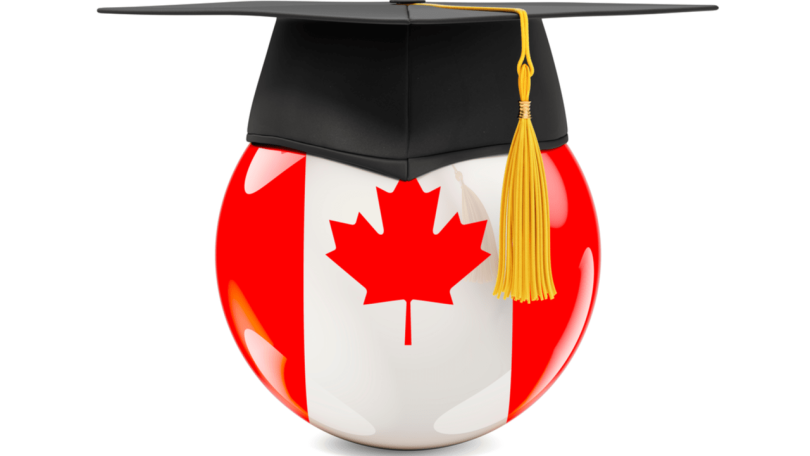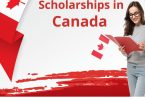Are you in need of financial aid to pursue your education? Discover the fully funded scholarships available in Canada for 2024. Explore opportunities that cover tuition fees, living expenses, and more, providing you with the chance to focus on your personal and professional development. Don’t miss out on this valuable resource!
Introduction
Are you looking to study abroad in Canada and worried about finances? It is true that Canada is one of the most expensive countries in the world but scholarships can help you with easy finances to pursue a degree program in the country. Canada offers many fully funded scholarships for international students to help them get swift admissions in renowned universities across the country. If you are looking for more information on full scholarships in Canada 2024, you have come to the right place. We will tell you all about the different funded grants available for international students to pursue a degree in the country. We will also talk about tips to win fully funded scholarships in Canada for international students this year.
Canada is a great option for students wanting to pursue higher education but face financial barriers. Fully funded scholarships can help international students achieve their academic goals.
List Of Fully Funded Scholarships
Graduate Studies Scholarships
Vanier Canada Graduate Scholarships
This scholarship is awarded to both Canadian and international students pursuing doctoral studies in social sciences, humanities, natural sciences, engineering, or health sciences.
Ontario Graduate Scholarship (OGS)
Available to international students pursuing graduate studies at the master’s or doctoral level in Ontario. The award is merit-based and offers financial support in the form of a stipend.
Trudeau Foundation Scholarships
These scholarships are aimed at outstanding doctoral candidates in the social sciences and humanities. The award includes a generous annual stipend for three years.
NSERC Postgraduate Scholarships
Offered by the Natural Sciences and Engineering Research Council of Canada, these scholarships support graduate studies in the natural sciences or engineering fields. They are available to Canadian citizens, permanent residents, and international students.
Canada Graduate Scholarships-Master’s Program (CGS-M)
Administered by the Canadian Institutes of Health Research (CIHR), the Natural Sciences and Engineering Research Council (NSERC), and the Social Sciences and Humanities Research Council (SSHRC), these scholarships support high-achieving Canadian and international students pursuing master’s degrees in eligible fields.
Banting Postdoctoral Fellowships
These fellowships are awarded to top-tier postdoctoral researchers, both Canadian and international, across various disciplines. The award provides financial support for two years.
Fulbright Canada Awards
These awards support exceptional students, scholars, and professionals from the United States who wish to study or conduct research in Canada. They cover a wide range of disciplines and academic levels.
Postdoctoral Awards
Canada offers several postdoctoral awards to support researchers in their postdoctoral studies. Here are some notable postdoctoral awards available in Canada:
- Banting Postdoctoral Fellowships: This prestigious fellowship program is open to both Canadian and international researchers. It provides funding for postdoctoral research in health sciences, natural sciences, engineering, social sciences, and humanities.
- Mitacs Elevate: Mitacs is a national, not-for-profit organization that offers the Elevate program to support postdoctoral fellows in research collaborations with industry partners. The program provides funding for two-year postdoctoral projects.
- NSERC Postdoctoral Fellowships: Administered by the Natural Sciences and Engineering Research Council of Canada (NSERC), this fellowship program supports postdoctoral researchers in natural sciences and engineering disciplines. Both Canadian and international applicants are eligible.
- Vanier-Banting Postdoctoral Fellowships: This program combines the excellence of the Vanier Canada Graduate Scholarships and the Banting Postdoctoral Fellowships. It offers prestigious funding opportunities for top-tier postdoctoral researchers in Canada.
- Trudeau Foundation Postdoctoral Fellowships: This fellowship program supports postdoctoral researchers in the social sciences and humanities. The program focuses on research related to the four themes of the Trudeau Foundation: human rights and dignity, responsible citizenship, Canada and the world, and people and their natural environment.
- Canadian Institutes of Health Research (CIHR) Postdoctoral Fellowships: CIHR offers postdoctoral fellowships in health research for both Canadian and international researchers. The fellowships provide support for research training in biomedical, clinical, health systems, and social, cultural, and environmental health research areas.
- The Canada Council for the Arts: The Canada Council for the Arts offers various grants and awards for postdoctoral researchers in artistic disciplines. These grants support research, creation, and professional development in fields such as visual arts, music, literature, and performing arts.
Visiting Scholars
Canada welcomes visiting scholars from around the world to collaborate with Canadian universities, research institutions, and other organizations. Here are some avenues through which visiting scholars can pursue opportunities in Canada:
- Visiting Scholar Programs: Many Canadian universities and research institutions have their own visiting scholar programs. These programs allow international scholars to spend a defined period of time conducting research, collaborating with faculty members, and participating in academic activities. The specific requirements and application processes vary, so it is advisable to explore the websites of individual institutions for details.
- Mitacs Globalink Research Internship: Mitacs offers the Globalink Research Internship program, which provides opportunities for undergraduate and graduate students from around the world to conduct research at Canadian universities for a period of 12 to 24 weeks. This program fosters research collaborations and allows visiting scholars to contribute to ongoing projects.
- Fulbright Canada: The Fulbright program offers several opportunities for scholars, including the Fulbright Visiting Research Chairs program. This program enables American scholars to teach and conduct research at Canadian universities across various disciplines.
- Vanier Canada Graduate Scholarships: While primarily aimed at doctoral students, the Vanier Canada Graduate Scholarships also offer opportunities for visiting scholars. Canadian universities nominate visiting Vanier scholars, who can then conduct research at Canadian institutions with the support of the scholarship.
- Government-Funded Programs: The Canadian government, through its various agencies, offers funding programs that support international collaboration and research exchanges. Examples include the Canada-China Scholars’ Exchange Program, the Emerging Leaders in the Americas Program (ELAP), and the Canada-ASEAN Scholarships and Educational Exchanges for Development (SEED).
- Research Collaborations and Invitations: Visiting scholars can explore opportunities for collaboration by directly contacting Canadian researchers and institutions in their field of interest. By establishing research connections and receiving invitations, scholars can visit Canada to conduct joint research, give lectures, or participate in academic events.
Prime Minister Awards
The Prime Minister’s Awards in Canada are prestigious national awards that recognize outstanding achievements and contributions in various fields. Here are three significant Prime Minister Awards in Canada:
- Prime Minister’s Awards for Teaching Excellence: These awards celebrate exceptional elementary and secondary school teachers across Canada. The awards recognize their innovative teaching methods, commitment to students’ success, and positive impact on their communities. Recipients of these awards receive a certificate of recognition, a letter from the Prime Minister, and a financial prize.
- Prime Minister’s Awards for Early Career Researchers: These awards acknowledge exceptional early-career researchers who have demonstrated outstanding potential in their fields. The awards cover a wide range of research areas and aim to support and encourage young researchers in their pursuit of knowledge and innovation. Recipients of these awards receive a certificate of recognition, a letter from the Prime Minister, and a research grant.
- Prime Minister’s Awards for Excellence in the Public Service: These awards recognize the exceptional contributions and achievements of public servants at the federal level. They highlight individuals and teams who have made significant impacts on the delivery of government programs and services, fostered innovation, and demonstrated leadership. The awards are given in different categories, such as Outstanding Career, Excellence in Citizen-Focused Service Delivery, and Excellence in Policy. Recipients receive a certificate of recognition and a letter from the Prime Minister.
>>Read More: Live & Work in US with Visa Sponsorship from Top Companies | Quick Guide
Eligibility Criteria
Residency Requirement In Canada for International Students
Canada does not have a specific residency requirement for international students studying in the country. However, there are certain conditions and guidelines that international students must adhere to during their studies.
- Study Permit: International students who wish to study in Canada for more than six months are required to obtain a study permit. This permit allows them to remain in Canada for the duration of their program of study. The study permit is typically tied to a specific educational institution and program.
- Full-Time Enrollment: International students must maintain full-time enrollment in a recognized educational institution to maintain their study permit status. Generally, this means being enrolled in at least 60% of a full course load per semester.
- Temporary Resident Visa: Depending on their country of citizenship, international students may also need to apply for a temporary resident visa (TRV) or an Electronic Travel Authorization (eTA) to enter Canada. These are separate documents from the study permit and are required to gain entry into the country.
- Residency While Studying: International students are expected to reside in Canada while they are studying. They must maintain a valid study permit and comply with the conditions outlined by the Canadian immigration authorities. These conditions may include providing updates on their contact information and informing the authorities of any changes in their program or educational institution.
- Post-Graduation Work Permit: After completing their studies, international students may be eligible to apply for a post-graduation work permit (PGWP). The PGWP allows them to work in Canada for a period of time equal to the length of their study program, up to a maximum of three years. The PGWP provides an opportunity to gain valuable work experience in Canada.
Academic Merits Requirements in Canada for International Students
Academic merit requirements for international students in Canada vary depending on the level of study (undergraduate or graduate) and the specific university or program to which they are applying. Here are some general considerations regarding academic merit requirements for international students:
- Undergraduate Studies:
- Secondary School Transcripts: International students typically need to provide their secondary school transcripts or their equivalent, demonstrating successful completion of their secondary education. The specific grade point average (GPA) or grading scale required may vary by institution and program.
- English Language Proficiency: Most Canadian universities require international students to demonstrate proficiency in English by submitting scores from standardized tests such as the TOEFL (Test of English as a Foreign Language) or IELTS (International English Language Testing System).
- Graduate Studies:
- Bachelor’s Degree: International students applying for graduate programs usually need to hold a bachelor’s degree or its equivalent from a recognized institution. The degree should be in a related field to the program they are applying for.
- Grade Point Average: Many universities require a minimum GPA for admission to graduate programs. The specific GPA requirement varies by institution, program, and even competitiveness of the program.
- Standardized Tests: Some graduate programs may require international students to submit scores from standardized tests such as the GRE (Graduate Record Examination) or GMAT (Graduate Management Admission Test). However, the requirement varies by program, and some programs may waive this requirement or make it optional.
How To Apply
Understanding The Application Instructions
Applying for fully funded scholarships in Canada typically involves several steps.
- Research Scholarship Opportunities: Begin by researching available fully funded scholarship programs in Canada. Explore scholarship databases, university websites, government-sponsored programs, and external funding sources. Pay attention to eligibility criteria, application deadlines, and required documentation.
- Select Suitable Scholarships: Identify scholarships that align with your academic background, field of study, and career goals. Review the scholarship requirements, including academic merit, research proposal, leadership qualities, community involvement, and any specific criteria outlined by the scholarship provider.
- Prepare Required Documents: Gather the necessary documents for your scholarship application. These commonly include academic transcripts, letters of recommendation, statement of purpose, research proposal (if applicable), resume or curriculum vitae, and proof of English language proficiency (such as TOEFL or IELTS scores).
- Write a Compelling Application: Craft a well-written application that effectively highlights your achievements, qualifications, and motivations. Tailor your statement of purpose and research proposal to showcase your academic and career aspirations, and how the scholarship will help you achieve them.
- Seek Letters of Recommendation: Request letters of recommendation from professors, academic advisors, or professionals who can speak to your academic abilities, research potential, leadership skills, or community involvement. Provide them with ample time to write detailed and personalized letters on your behalf.
- Submit Your Application: Follow the specific instructions provided by the scholarship program and submit your application by the designated deadline. Ensure that all required documents are included and adhere to any formatting or submission guidelines.
- Follow-Up and Await Results: After submitting your application, monitor the application status and keep track of any additional requirements or notifications from the scholarship provider. Be patient during the evaluation process and wait for the results, which may take several weeks or months.
- Consider Alternative Funding Sources: While waiting for scholarship results, explore alternative funding options, such as assistantships, grants, or fellowships, to secure financial support for your studies in case the fully funded scholarship is not awarded.
Documents Needed To apply for fully funded scholarship in Canada
- Completed Application Form: Complete the scholarship application form provided by the scholarship program or the Canadian university offering the scholarship.
- Academic Transcripts: Provide official transcripts from your previous educational institutions, including high school or secondary school transcripts for undergraduate scholarships, and undergraduate or graduate transcripts for postgraduate scholarships. These transcripts should show your grades or marks in completed courses.
- Proof of English Language Proficiency: International applicants are usually required to demonstrate their English language proficiency through standardized tests such as the TOEFL (Test of English as a Foreign Language) or IELTS (International English Language Testing System). Submit your official test scores or any other acceptable proof of language proficiency.
- Curriculum Vitae (CV) or Resume: Prepare a comprehensive CV or resume that outlines your educational background, work experience, research projects, publications (if any), extracurricular activities, and any relevant awards or achievements.
- Letters of Recommendation: Request letters of recommendation from professors, research advisors, or professionals who can attest to your academic abilities, research potential, leadership qualities, or other relevant qualities. Aim to have two to three strong letters of recommendation.
- Statement of Purpose or Research Proposal: Write a compelling statement of purpose or research proposal that outlines your academic and career goals, research interests, and how the scholarship will help you achieve them. This document should demonstrate your passion, motivation, and suitability for the scholarship program.
- Financial Documents: Some scholarship programs may require proof of financial need or evidence of your ability to cover additional expenses not covered by the scholarship. This may include bank statements, income certificates, or other financial documents.
- Passport and Identification: Provide a copy of your passport or other identification documents to verify your identity and citizenship.
Benefits Of Fully Funded Scholarships In Canada
All Expenses Covered
Fully funded scholarships in Canada that cover all expenses are highly competitive and usually offered by prestigious organizations or institutions. These scholarships typically cover tuition fees, living expenses, travel costs, health insurance, and other related expenses. Here are a few notable fully funded scholarship opportunities in Canada:
- Vanier Canada Graduate Scholarships: The Vanier Canada Graduate Scholarships are one of the most prestigious fully funded scholarships in Canada. They are awarded to exceptional doctoral students pursuing research in health sciences, natural sciences, engineering, social sciences, or humanities. The scholarship provides an annual value of CAD 50,000 for up to three years.
- Trudeau Foundation Scholarships: The Trudeau Foundation offers fully funded scholarships to outstanding doctoral students in social sciences and humanities. The scholarship provides an annual stipend of up to CAD 60,000 for up to four years, covering tuition fees, living expenses, research-related travel, and more.
- IDRC Research Awards: The International Development Research Centre (IDRC) offers fully funded research awards to students from developing countries pursuing a master’s or doctoral degree at a recognized Canadian university. The award covers tuition fees, travel costs, a monthly stipend, and research-related expenses.
- Global Affairs Canada Scholarships: Global Affairs Canada offers fully funded scholarships to international students through various programs such as the Canada-CARICOM Leadership Scholarships Program and the Canada-Chile Leadership Exchange Scholarship. These scholarships cover tuition fees, living expenses, travel costs, and other related expenses.
- Organization of American States (OAS) Scholarships: The OAS offers fully funded scholarships to citizens of OAS member countries to pursue undergraduate, graduate, or doctoral studies at Canadian universities. The scholarships cover tuition fees, living expenses, health insurance, and travel costs.
Conclusion
Fully funded scholarships in Canada are an excellent way to fulfil international students’ educational aspirations without worrying about financial constraints.










